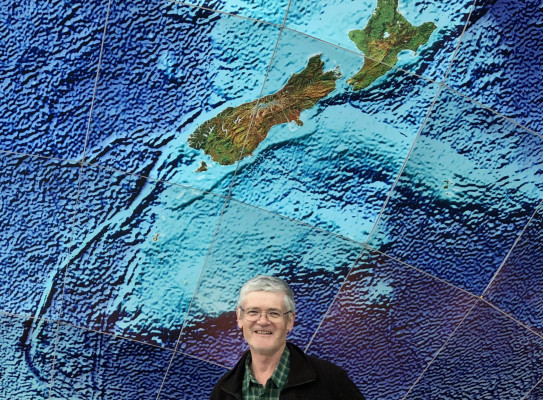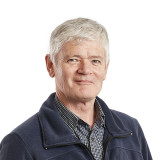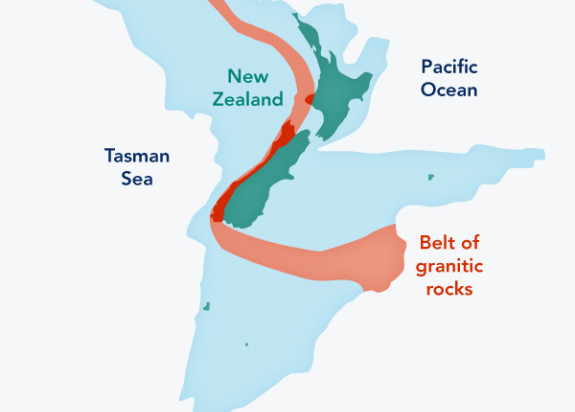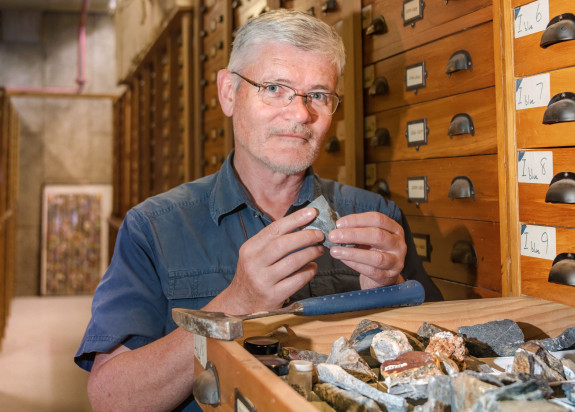James Cook Research Fellowship for Te Riu‐a‐Māui / Zealandia study

Te Pū Ao GNS Science’s Dr Nick Mortimer has been awarded a 2022 James Cook Research Fellowship.
The fellowships are awarded to researchers at the height of their careers, allowing them to undertake study or research in their field of endeavour for two years, recognising their sustained research excellence. The funding package annually is $100,000 plus GST and $10,000 plus GST in relevant expenses.
A geologist with expertise in petrology and geochemistry, Nick’s career at GNS Science’s Dunedin Research Centre has led to scientific advances in many aspects of the onland and offshore regional geology and tectonics of Aotearoa / New Zealand, Te Riu-a-Māui / Zealandia, and the Southwest Pacific Ocean.


For this James Cook Research Fellowship project, Dr Mortimer intends to produce up to date, authoritative reviews of the geological makeup and ancestry of the continent of Te Riu-a-Māui / Zealandia. One will be a research publication for geoscientists, the plan for the other is a book for general audiences that explains the geological exploration, discovery, and origins of our continent alongside Māori perspectives of its exploration, discovery, and origins.
“In these days of climate, energy, infrastructure, economic, social and pandemic crises it’s easy to overlook the fundamentals of basic natural science,” Nick says. “

Exploration and discovery of the natural world, and new perspectives on it, still educate and inspire
“This funding will allow let me write a much-needed update of my most in-demand research paper, the 2004 ‘New Zealand’s geological foundations’. That paper is really showing its age: the illustrations are black and white and, 18 years ago, we were still very tentative about the viability of the Zealandia continent. Now, we are a lot more confident. Having Earth’s eighth continent on the map explains so much about hazards, resources and biota.”
Nick says exploration, discovery, context and background are very important to him.
“I’ve always felt that, among geologists a little petrology can go a long way. And, among scientists, a little geology can go a long way. Science and society are disadvantaged by their lack of a deep time perspective on the world. Personal recognition is always nice, but what is more important to me is the recognition of geology among the physical sciences, and of a CRI in the New Zealand research scene. My current and former GNS colleagues have always given me great support and encouragement. Only at GNS Science with its long-term core programmes and emphasis on teamwork, could the Zealandia story have developed, grown and matured in the way it has."
For me, this is a real ‘shoulders of giants’ moment. The single most influential person in my career was my Stanford PhD supervisor, the petrologist Bob Coleman. Bob died in 2021, aged 97.
During the fellowship, Dr Mortimer will seek collaborators to bridge the physical sciences and mātauranga Māori.
“Māori history and traditions provide interesting parallels, timescales, and context for the scientific view of the continent, and vice-versa. If I can find appropriately motivated colleagues, I’m looking forward to writing a jointly-authored book on scientific and Māori accounts of the exploration, discovery and origins of Aotearoa and Zealandia. Last but not least, it’s another opportunity to explain and promote ‘Te Riu-a-Māui’, the Māori name for our continent.”
As well as the written outputs, results from the project will be presented as public talks around the motu.
This is not the first honour for Nick as he was elected a Fellow of the Royal Society Te Apārangi in 2017, and in 2020 received a Science New Zealand Individual Lifetime Achievement Award.
The Fellowships are managed by Royal Society Te Apārangi on behalf of the New Zealand Government with funding from the Ministry of Business, Innovation and Employment.